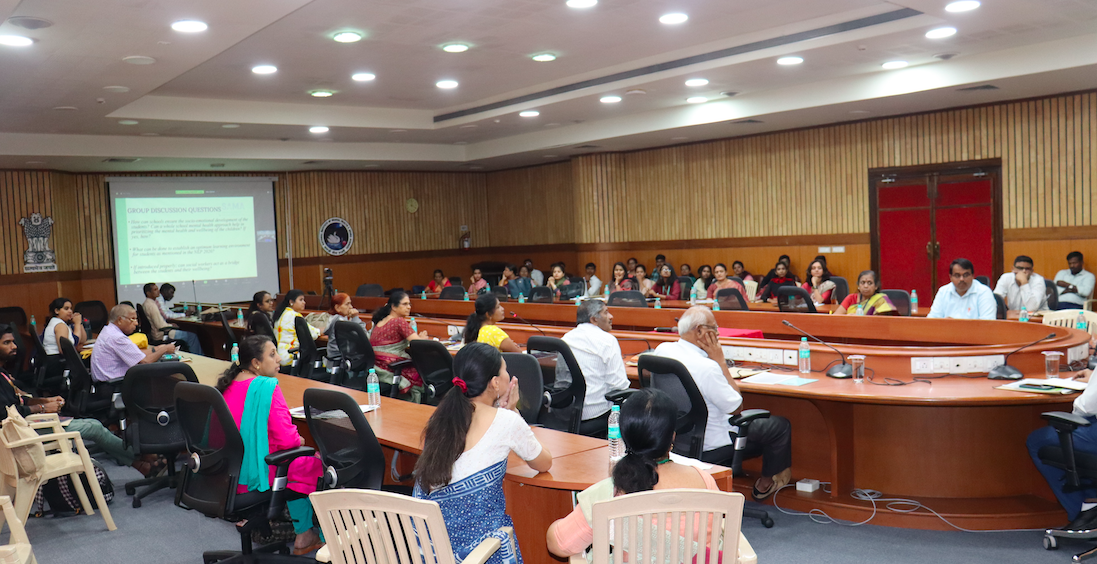SAMA Blog
A collection of the latest SAMA stories, insights and updates.
The Challenges of Determining the Prevalence of Depression Among Indian Adolescents
Depression is a common illness worldwide, occurring in all age groups (Keren & Tyano, 2006), with estimates suggesting 280 million people (3.8% of the population) worldwide suffer from depression (World Health Organization, 2023). Depression is the leading cause of disability worldwide (Reddy, 2010), estimated to occur among 1.1% of adolescents aged 10-14 years and 2.8% of adolescents aged 15-19 worldwide (World Health Organization, 2021). Research is beginning to identify and estimate the prevalence of depression in adolescents globally, however data from India is currently incomplete and sometimes conflicting.
SAMA Dissemination Event
In June 2024 we held the SAMA Dissemination Event in NIMHANS, India. This was a participatory, full-day event where the SAMA team presented our findings from Project SAMA. Alongside this, discussions surrounding scaling up SAMA and the necessary steps for advancing school mental health initiatives were held. There were 43 attendants at the event including researchers, and representatives and heads of various organizations.
SAMA at the Karolinska Institutet – UNICEF Joint Conference on Global Child and Adolescent Mental Health
This conference jointly hosted by the Karolinska Institutet and UNICEF focused on child and adolescent mental health to identify ‘bold ideas for brighter futures’ for young people around the world. Two researcher from Project SAMA presented research.
Teacher Burnout and Corporal Punishment: Can students be safe in the classrooms without prioritising educators?
The effects of burnout are felt by many people in many professions worldwide. In this blog we take a deeper look into how teacher burnout can lead to an increase in corporal punishment and how we can decrease this negative consequence.
Strategies to Enhance the Implementation of Universal Mental Health Prevention Programs in Schools
A discussion of the paper “Strategies for Enhancing the Implementation of Universal Mental Health Prevention Programs in Schools: A Systematic Review” (Baffsky et al., 2022)
Policy; Definitions, Overview and Importance
Policy
A set of rules or norms governing behaviour in a particular area of activity - established by an organisation (the “policy-maker”) accepted as having authority to set such rules or norms. The basis of this authority is usually, but not universally, statutory in nature. It may also include authority to enforce the rules
Research To Policy : A dialogue on mental health of the young people of India
SAMA’s research to policy work package aims to promote school research in India and identify implementation facilitators and barriers across our intervention components. Transforming research into policy is crucial for creating effective, evidence based solutions to societal challenges, promoting accountability and transparency and ensuring that resources are used efficiently to benefit society. It is a fundamental aspect of good governance and decision making (Keping, 2018).
Transforming School Mental Health in India: Embracing a Comprehensive Approach
Mental health has emerged as a critical concern among school-going adolescents in India, a country with a vast and diverse youth population. Addressing mental health issues within the educational system is of paramount importance. In a recent publication titled "School mental health program in India: Need to shift from a piecemeal approach to a long-term comprehensive approach with strong intersectoral coordination," the urgent need for…
SAMA at the Health Economics Study Group (HESG) Summer Conference 2023
As part of work package 6 (health economics) we have been feasibility testing questionnaires which are typically used in health economics research to measure quality of life in adolescents. These measures have generally been developed and validated in high-income countries (HICs), but …
Data collection for health economics
My visit to India had two key aims. The first was to conduct the think-aloud interviews with adolescents in schools to feasibility test the EQ-5D-Y and CHU-9D. The second was to discuss the information I require for the micro-costing of SAMA with members of the NIMHANS team and the potential avenues for upscaling SAMA with government officials. Throughout the trip…
Capturing the thoughts, processes and experiences of positive emotional well-being in Indian adolescents: A Focus Group Study
On a global scale, adolescent voice and perspective has been largely absent from mental health research. However, this is changing, with the development of the research agender calling for ‘no research about me without me’ (BMC, 2018). This agenda stresses the importance of including the thoughts and experiences of the target population in research, ensuring that the research conducted is reflective of real-life contexts, ultimately adding value to the current research, as well as the wider field. The inclusion of young people’s voice in psychological wellbeing and mental health research is important as …
How do young people view SAMA? A youth-led participatory video workshop by Paul Cooke in Kolar
What first attracted me to working on Project SAMA was the fundamental ethos of the project, and the ways in which the intervention to be developed was to be rooted in the lived experience of young people. Since 2015 I have been working on a number of projects that have adopted a similar approach to their design and delivery…
Lived experiences through the lens of child carers
Illness of any kind, physical or mental can cause parents to experience difficulties in performing their parental or caregiving role to the optimum. In certain cases, where the parent with illness fails to perform their caregiving role, role reversal between the parent and the child may take place where the child begins to take care of other members in the family including the parent…
Youth involvement assessment, encouragement, and research participation- Youth Star
Youth star was developed in order to assist researchers and practitioners to assess the extent of youth involvement and enhance their involvement through supportive dialogue between youth and service providers. The youth star is for young people taking part in community-based youth projects. It helps to focus on building the confidence and the skills those need to take part and do what they want in life. It improves their communication to get their point across, making better choices or taking part in youth, community, or other activities that they enjoy and which expand their skills or help other people.
Back to School - Voices of Adolescents, Teachers and Parents
Starting a new school year is always full of emotions and especially during a pandemic.
For nearly 77 million children, the pandemic has taken away their classrooms for the past 18 months. School children worldwide have lost 1.8 trillion hours and counting of in-person learning due to COVID-19 lockdowns.
Part of the schools started teaching at classrooms, other part continues the distance learning. But children in every city or village are looking forward to meet their friends and teachers in person (UNICEF, 2021).
We asked adolescents, teachers and parents to tell what they feel, how their lives have changed and advantages and challenges of school reopening.
Students need compassion instead of punishment
“Chadi lage cham-cham vidhya aaye gham-gham…” a popular Marathi song indicates that with caning, knowledge comes spontaneously and thus subsuming such beliefs, punishment has been practised in Indian schools for several years in the garb of disciplining students. The Government of India commissioned research that included over 3,000 children aged from 5 to 18, who were asked about physical abuse by teachers and the results showed
Online education- A solution or a problem?
Children and adolescents spend most of their time in schools, due to which schools are crucial in child and adolescent development. The positive interactions between the students and teachers, the peer interactions, the joint activities that students are involved in, the consequent learning, and the education process contribute to social, emotional, and cognitive development in the students.


















